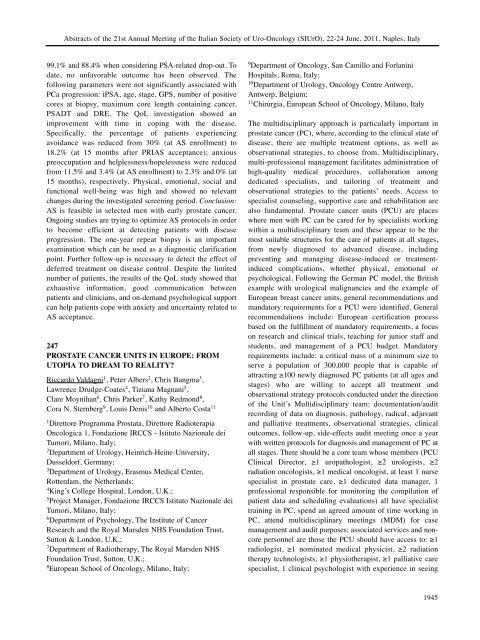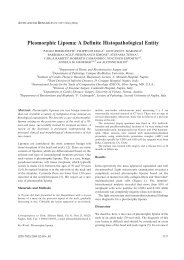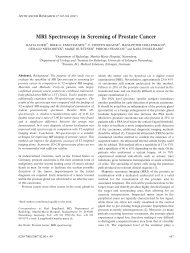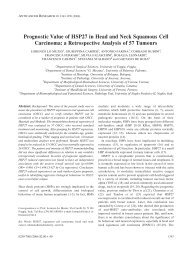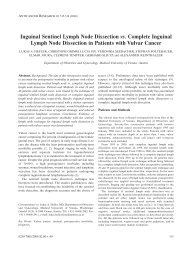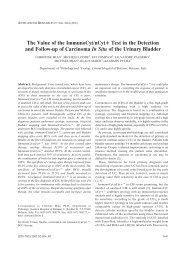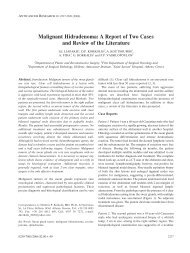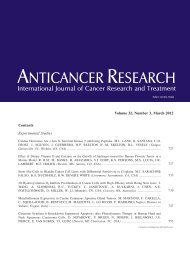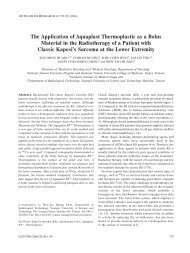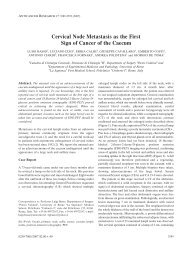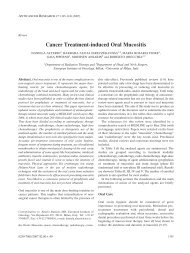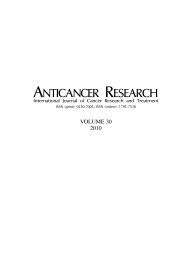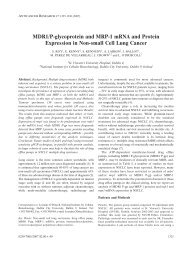ABSTRACTS OF THE 21st ANNUAL MEETING OF THE ITALIAN ...
ABSTRACTS OF THE 21st ANNUAL MEETING OF THE ITALIAN ...
ABSTRACTS OF THE 21st ANNUAL MEETING OF THE ITALIAN ...
Create successful ePaper yourself
Turn your PDF publications into a flip-book with our unique Google optimized e-Paper software.
Abstracts of the <strong>21st</strong> Annual Meeting of the Italian Society of Uro-Oncology (SIUrO), 22-24 June, 2011, Naples, Italy<br />
99.1% and 88.4% when considering PSA-related drop-out. To<br />
date, no unfavorable outcome has been observed. The<br />
following parameters were not significantly associated with<br />
PCa progression: iPSA, age, stage, GPS, number of positive<br />
cores at biopsy, maximum core length containing cancer,<br />
PSADT and DRE. The QoL investigation showed an<br />
improvement with time in coping with the disease.<br />
Specifically, the percentage of patients experiencing<br />
avoidance was reduced from 30% (at AS enrollment) to<br />
18.2% (at 15 months after PRIAS acceptance); anxious<br />
preoccupation and helplessness/hopelessness were reduced<br />
from 11.5% and 3.4% (at AS enrollment) to 2.3% and 0% (at<br />
15 months), respectively. Physical, emotional, social and<br />
functional well-being was high and showed no relevant<br />
changes during the investigated screening period. Conclusion:<br />
AS is feasible in selected men with early prostate cancer.<br />
Ongoing studies are trying to optimize AS protocols in order<br />
to become efficient at detecting patients with disease<br />
progression. The one-year repeat biopsy is an important<br />
examination which can be used as a diagnostic clarification<br />
point. Further follow-up is necessary to detect the effect of<br />
deferred treatment on disease control. Despite the limited<br />
number of patients, the results of the QoL study showed that<br />
exhaustive information, good communication between<br />
patients and clinicians, and on-demand psychological support<br />
can help patients cope with anxiety and uncertainty related to<br />
AS acceptance.<br />
247<br />
PROSTATE CANCER UNITS IN EUROPE: FROM<br />
UTOPIA TO DREAM TO REALITY?<br />
Riccardo Valdagni1 , Peter Albers2 , Chris Bangma3 ,<br />
Lawrence Drudge-Coates4 , Tiziana Magnani5 ,<br />
Clare Moynihan6 , Chris Parker7 , Kathy Redmond8 ,<br />
Cora N. Sternberg9 , Louis Denis10 and Alberto Costa11 1Direttore Programma Prostata, Direttore Radioterapia<br />
Oncologica 1, Fondazione IRCCS - Istituto Nazionale dei<br />
Tumori, Milano, Italy;<br />
2Department of Urology, Heinrich-Heine-University,<br />
Dusseldorf, Germany;<br />
3Department of Urology, Erasmus Medical Center,<br />
Rotterdam, the Netherlands;<br />
4King’s College Hospital, London, U.K.;<br />
5Project Manager, Fondazione IRCCS Istituto Nazionale dei<br />
Tumori, Milano, Italy;<br />
6Department of Psychology, The Institute of Cancer<br />
Research and the Royal Marsden NHS Foundation Trust,<br />
Sutton & London, U.K.;<br />
7Department of Radiotherapy, The Royal Marsden NHS<br />
Foundation Trust, Sutton, U.K.;<br />
8European School of Oncology, Milano, Italy;<br />
9Department of Oncology, San Camillo and Forlanini<br />
Hospitals, Roma, Italy;<br />
10Department of Urology, Oncology Centre Antwerp,<br />
Antwerp, Belgium;<br />
11Chirurgia, European School of Oncology, Milano, Italy<br />
The multidisciplinary approach is particularly important in<br />
prostate cancer (PC), where, according to the clinical state of<br />
disease, there are multiple treatment options, as well as<br />
observational strategies, to choose from. Multidisciplinary,<br />
multi-professional management facilitates administration of<br />
high-quality medical procedures, collaboration among<br />
dedicated specialists, and tailoring of treatment and<br />
observational strategies to the patients’ needs. Access to<br />
specialist counseling, supportive care and rehabilitation are<br />
also fundamental. Prostate cancer units (PCU) are places<br />
where men with PC can be cared for by specialists working<br />
within a multidisciplinary team and these appear to be the<br />
most suitable structures for the care of patients at all stages,<br />
from newly diagnosed to advanced disease, including<br />
preventing and managing disease-induced or treatmentinduced<br />
complications, whether physical, emotional or<br />
psychological. Following the German PC model, the British<br />
example with urological malignancies and the example of<br />
European breast cancer units, general recommendations and<br />
mandatory requirements for a PCU were identified. General<br />
recommendations include: European certification process<br />
based on the fulfillment of mandatory requirements, a focus<br />
on research and clinical trials, teaching for junior staff and<br />
students, and management of a PCU budget. Mandatory<br />
requirements include: a critical mass of a minimum size to<br />
serve a population of 300,000 people that is capable of<br />
attracting ≥100 newly diagnosed PC patients (at all ages and<br />
stages) who are willing to accept all treatment and<br />
observational strategy protocols conducted under the direction<br />
of the Unit’s Multidisciplinary team; documentation/audit<br />
recording of data on diagnosis, pathology, radical, adjuvant<br />
and palliative treatments, observational strategies, clinical<br />
outcomes, follow-up, side-effects audit meeting once a year<br />
with written protocols for diagnosis and management of PC at<br />
all stages. There should be a core team whose members (PCU<br />
Clinical Director, ≥1 uropathologist, ≥2 urologists, ≥2<br />
radiation oncologists, ≥1 medical oncologist, at least 1 nurse<br />
specialist in prostate care, ≥1 dedicated data manager, 1<br />
professional responsible for monitoring the compilation of<br />
patient data and scheduling evaluations) all have specialist<br />
training in PC, spend an agreed amount of time working in<br />
PC, attend multidisciplinary meetings (MDM) for case<br />
management and audit purposes; associated services and noncore<br />
personnel are those the PCU should have access to: ≥1<br />
radiologist, ≥1 nominated medical physicist, ≥2 radiation<br />
therapy technologists, ≥1 physiotherapist, ≥1 palliative care<br />
specialist, 1 clinical psychologist with experience in seeing<br />
1945


